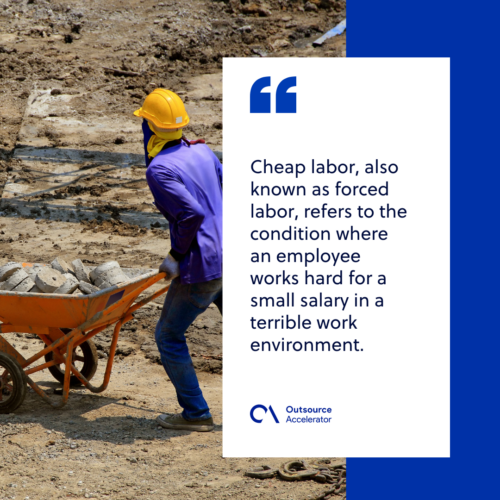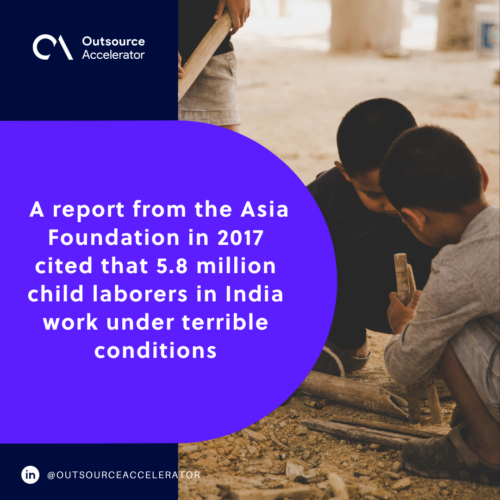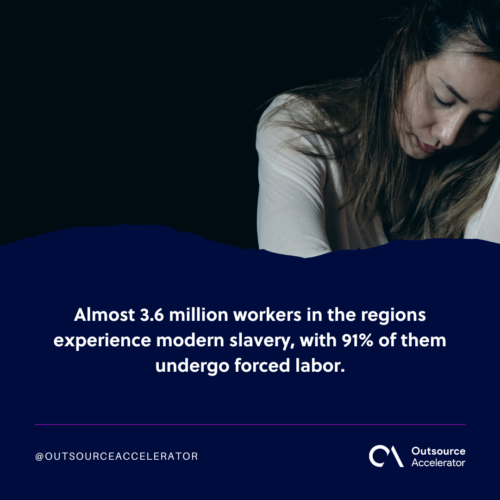Outsourcing is not cheap labor

Before, people tend to look away when it comes to the issue of cheap labor in different countries.
Now, companies have slowly become concerned about the ethical conditions within their operations. This is thanks to the consumers that have increased their awareness and concern about the issue.
No matter how forward their labor laws are, it is still practiced, especially in developing countries. Immigrants and individuals from the lower-income sector still fall prey to cheap labor practices.
Business process outsourcing may involve saving costs and resources, but it is not cheap labor in general.
This article delves into the definition and characteristics of cheap labor, how countries and employers regulate against it, and the reason outsourcing should not be considered cheap labor.
What is cheap labour
Cheap labor, also known as forced labor, refers to the condition where an employee works hard for a small salary in a terrible work environment.
In some instances, cheap labor is defined as “modern slavery” due to the inhumane conditions the employees undergo.
To cut costs, some businesses subscribe to these measures, regardless if they sacrifice the employees’ welfare. Those in developing countries such as Bangladesh and Vietnam are prone to having these work conditions.
Cheap labor practices usually involve the following:
- Using child labor
- Setting 90 to 120-hour work
- Underpaying employees with less than a penny an hour
- Avoiding employee benefits and labor protection set by the country, and
- Forcing employees to work in sub-par conditions.
According to the International Labour Organization (ILO), there are around 25 million people worldwide that are victims of this practice.

Physical vs digital labor
Currently, cheap labor goes in two ways: through physical and digital labor.
- Physical labor. This involves abuse of manual labor which happens in factories, sweatshops, and even farms.
- Digital labor. Cheap labor doesn’t just reflect on manufacturing. It is also prominent with online workers. Some of them are paid below the standard rate, around $1-$2/hour. According to a report by PayPal, 58% of freelancers in their poll even experienced not getting paid at all.
History of cheap labor
The origins of cheap labor practices started along with the rise of the industrial revolution. It is said that the fierce competition among contractors and the spike in the employment market “kept wages low and work hours high”.
The three industrial countries United States, Britain, and Germany were said to have started using cheap labor for their industrial production. Their first workers were either migrants or people from the countryside desperate for work in the cities.
The labor movement in the US helped workers improve their economic standing and welfare. They negotiated in regulating working hours, standard pay, and benefits for each worker regardless of their immigration status.
Cheap labor in different countries
Despite the work done by organizations and institutions in fighting cheap labor practices, this is still rampant both developing and developed countries. These include:
China
China is currently developing its ways, and cheap labor is not that cheap anymore. However, during its peak, Chinese manufacturers used workers under 16 years old to work in clothes factories, forcing them to go to work 28 days a month and get beaten when they misbehaved.
In a report by the Chinese labor bulletin, teenagers from poor families drop out of school to work in nearby factories and restaurants. Some of them are abducted from their families and forced to go into labor in some parts of the country.
India
Child labor is still prominent in rural India despite the growing outsourcing economy. A report from the Asia Foundation in 2017 cited that 5.8 million child laborers in India work under terrible conditions, the highest in South Asia. 100,000 of them work around 14 hours a day in sweatshops in Delhi.
This condition has even worsened due to the pandemic and the rise of extreme poverty. Most of them are either trafficked or promised a salary of 3,000 rupees (around $41).

The Philippines
The Philippines also has a share of cheap labor conditions. This involves the informal or underground sector. 88.1% of employment in the country comes from this.
As the Philippine Institute for Development Studies states, cheap labor practices in the country include a diversified set of economic activities, enterprises, jobs, and workers that are not regulated or protected by the state.
Women are the most vulnerable workers in this sector, having lower earnings, longer work hours, and poor working conditions.
While the government and labor organizations work to make things better for Filipino employees, there are still recorded cases as recent as 2019.
Mexico
Migrant workers in Mexico, meanwhile, are prone to terrible conditions in the country. In the account of migrant farmworkers, their employers don’t allow them to leave their farms. As a result, they buy their needs in their employers’ store which charges them too much.
They also don’t have contracts, social security, and adequate rest. The worker complained about experiencing work more than 12 hours for a few dollars, even though she was sick.
Bangladesh
Sweatshops and clothing factories are most prominent in Bangladesh. Big clothing companies like H&M, Zara, and Gap contract manufacturing work to this country, regardless of their working condition.
In a report by The Guardian in 2019, employees in a clothing factory are paid 35 pence an hour for a 54-hour workweek. They are even forced to render overtime just to reach unrealistic targets and are getting ill from the heat inside the factory.
Europe
Even in modern times, forced labor still rises in Europe and Central Asia. Almost 3.6 million workers in the regions experience modern slavery, with 91% of them undergo forced labor.
A report from a UK institution suggests that most of the forced work in nine EU countries involve domestic service, agriculture, and clothing industries, to name a few. It also reported that 60% of the workers from these EU countries came from their neighbor countries such as Romania and Bulgaria.

Ethiopia
Lastly, big companies also contract cheap labor in Africa for their products. Aside from Bangladesh, H&M and Calvin Klein source their products from Ethiopia. A few UK brands also go here for leather products.
However, this became a burden for its workers. They earn AU$26 a month, or just GBP 13, for their work, tagged as the lowest wages in the world. This barely covers their living allowance especially since their accommodation cost went up to AU$52 due to the influx of workers.
Regulations against cheap labor
Currently, all countries in the world continue to enforce and implement labor laws to protect the rights of their workers.
In the United States, for instance, the Fair Labour Standards Act (FLSA) states a standard federal minimum wage, overtime pay, record keeping, and youth employment standards in the private and public sectors.
In the United Kingdom, meanwhile, labor laws include anti-discrimination in the workplace, maternity leave, and requests for flexible working hours.
The International Labour Organization (ILO), established in 1919, brings together employers, workers, and the government of the United Nation’s 187 member states to set international labor standards and protect the welfare of all workers.
Outsourcing is not cheap labor
Despite its popularity, some labor movements condone the working conditions of outsourcing in different parts of the world. Saying it is a form of exploitation of workers in developing countries.
However, outsourcing, in general, should not be considered cheap labor. Governments even encourage it in their countries. BPO companies make sure that they follow the labor regulations of their location and provide a safe work environment for their workers.
In the Philippines, for instance, BPO employees receive a US$ 500 minimum salary. They even have bonuses and incentives and can participate in social events put up by their respective companies.
While social media virtual assistant rates can range up to $20, most employers are now conscious of providing them a fair salary with benefits and bonuses included.
Call centers comply with the regulations regarding benefits and wages in the country. They take care of their employees to keep them satisfied at work.
In South Africa and other developing countries, impact sourcing helps people beyond the poverty line gain employment and harness their skills for their work. This helps them improve their economic standing and contribute to their economy in return.
Outsourcing has helped different countries develop their economies by providing decent jobs to their people. So, thinking of it as cheap labor does not give justice to its contribution.







 Independent
Independent




